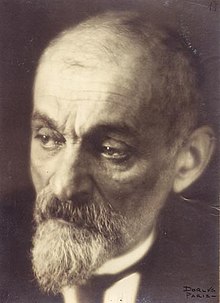Lev Shestov
| Lev Shestov | |
|---|---|
 |
|
| Born |
February 12, 1866 Kiev, Russian Empire |
| Died | November 19, 1938 (aged 72) Paris, France |
| Era | 19th-century philosophy |
| Region | Western Philosophy |
| School | Existentialism |
|
Main interests
|
Theology, nihilism |
|
Influences
|
|
Lev Isaakovich Shestov (Russian: Лев Исаа́кович Шесто́в, 1866 – 1938), born Yehuda Leyb Schwarzmann (Russian: Иегуда Лейб Шварцман), was a Russian existentialist philosopher. Born in Kyiv (Russian Empire) on February 12 [O.S. January 31] 1866, he emigrated to France in 1921, fleeing from the aftermath of the October Revolution. He lived in Paris until his death on November 19, 1938.
Shestov was born Lev Isaakovich Schwarzmann in Kiev into a Jewish family. He obtained an education at various places, due to fractious clashes with authority. He went on to study law and mathematics at the Moscow State University but after a clash with the Inspector of Students he was told to return to Kiev, where he completed his studies.
Shestov's dissertation prevented him from becoming a doctor of law, as it was dismissed on account of its revolutionary tendencies. In 1898 he entered a circle of prominent Russian intellectuals and artists which included Nikolai Berdyaev, Sergei Diaghilev, Dmitri Merezhkovsky and Vasily Rozanov. Shestov contributed articles to a journal the circle had established. During this time he completed his first major philosophical work, Good in the Teaching of Tolstoy and Nietzsche: Philosophy and Preaching; two authors profoundly impacting Shestov's thought.
He developed his thinking in a second book on Fyodor Dostoyevsky and Frederich Nietzsche, which increased Shestov's reputation as an original and incisive thinker. In All Things Are Possible (published in 1905) Shestov adopted the aphoristic style of Friedrich Nietzsche to investigate the difference between Russian and European Literature. Although on the surface it is an exploration of numerous intellectual topics, at its base it is a sardonic work of Existentialist philosophy which both criticizes and satirizes our fundamental attitudes towards life situations. D.H. Lawrence, who wrote the Foreword to S.S. Koteliansky's literary translation of the work, summarized Shestov's philosophy with the words: " 'Everything is possible' - this is his really central cry. It is not nihilism. It is only a shaking free of the human psyche from old bonds. The positive central idea is that the human psyche, or soul, really believes in itself, and in nothing else". Shestov deals with key issues such as religion, rationalism, and science in this highly approachable work, topics he would also examine in later writings such as In Job's Balances. Shestov's own key quote from this work is probably the following: "...we need to think that only one assertion has or can have any objective reality: that nothing on earth is impossible. Every time someone wants to force us to admit that there are other, more limited and limiting truths, we must resist with every means we can lay hands on".
...
Wikipedia
